
The Kansas Department of Corrections (KDOC) is a cabinet-level agency of Kansas that operates the state's correctional facilities, both juvenile and adult, the state's parole system, and the state's Prisoner Review Board. It is headquartered in Topeka.

The Kansas Legislature is the state legislature of the U.S. state of Kansas. It is a bicameral assembly, composed of the lower Kansas House of Representatives, with 125 state representatives, and the upper Kansas Senate, with 40 state senators. Representatives are elected for two-year terms, senators for four-year terms.

Free-Staters was the name given to settlers in Kansas Territory during the "Bleeding Kansas" period in the 1850s who opposed the expansion of slavery. The name derives from the term "free state", that is, a U.S. state without slavery. Many of the "free-staters" joined the Jayhawkers in their fight against slavery and to make Kansas a free state.
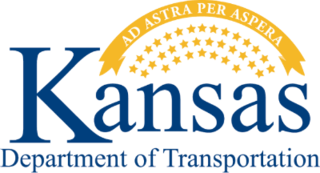
The Kansas Department of Transportation (KDOT) is a state government organization in charge of maintaining public roadways of the U.S. state of Kansas.
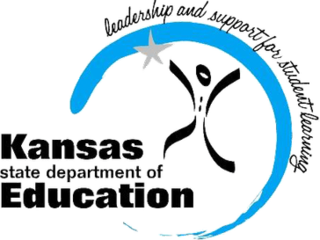
Kansas State Board of Education (KSDE) is Kansas's Board of Education, headquartered in Topeka. The board of education that controls the department is a constitutional body established in Article 6 of the Kansas Constitution. The ten members of the Board of Education are each elected to four-year terms. The Board helps determine educational policy for the state's primary and secondary schools.

Samuel Johnson Crawford was a Union Army officer during the American Civil War, and the third Governor of Kansas (1865–1868). He also served as one of the first members of the Kansas Legislature.

Kansas State School for the Blind (KSSB) is a fully accredited public high school located in Kansas City, Kansas, U.S., serving students in grades Pre-K through 12. The school was established in 1867. It is located on 10 acres (40,000 m2) located in downtown Kansas City, Kansas. It opened its doors in May, 1868 and admitted the first five students.
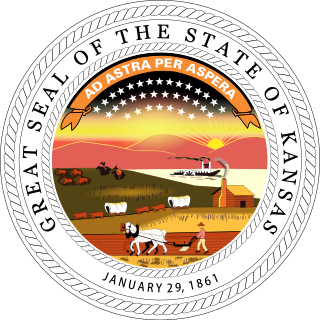
The government of the U.S. state of Kansas, established by the Kansas Constitution, is a republican democracy modeled after the Federal Government of the United States. The state government has three branches: the executive, the legislative, and the judicial. Through a system of separation of powers, or "checks and balances," each of these branches has some authority to act on its own, and also some authority to regulate the other two branches, so that all three branches can limit and balance the others' authority.
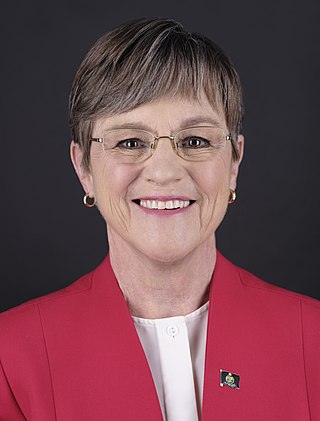
Laura Jeanne Kelly is an American politician serving since 2019 as the 48th governor of Kansas. A member of the Democratic Party, she represented the 18th district in the Kansas Senate from 2005 to 2019. Kelly was elected governor in 2018, defeating Republican nominee Kris Kobach. She was reelected in 2022, narrowly defeating Republican nominee Derek Schmidt by a 2.21% margin.

The Topeka State Hospital was a publicly funded institution for the care and treatment of the mentally ill in Topeka, Kansas, US, It was in operation from 1872 to 1997. Located at 2700 W 6th Street, the hospital opened in 1879, after the Osawatomie State Hospital, once thought to be sufficient, became overcrowded with mentally-ill patients.
The Nevada Department of Health and Human Services (DHHS) is a state agency of Nevada, headquartered in Suite 100 of the 4126 Technology Way building in Carson City. The agency provides health services and human services.
Osawatomie State Hospital is a public psychiatric hospital in the U.S. state of Kansas, located in the city of Osawatomie, Kansas. Established by the Kansas legislature in 1863 and opened in 1866, it is the oldest operating psychiatric hospital in the state of Kansas. It has been named "Kansas Insane Asylum" and the "State Insane Asylum" but was officially changed to its present name in 1901.

The Wisconsin Department of Health Services (WisDHS) is a governmental agency of the U.S. state of Wisconsin responsible for maintaining public health. It administers a wide range of services in the state and at state institutions, regulates hospitals and care providers, and supervises and consults with local public health agencies. Its responsibilities include public health; mental health and substance abuse; long-term support and care; services to people with disabilities, medical assistance, and children’s services; aging programs; physical and developmental disability services; blindness disability programs; operation of care and treatment facilities; quality assurance programs; nutrition supplementation programs; medical assistance; and health care for low-income families, elderly, and the disabled.

KVC Health Systems, Inc. (KVC) is a private, nonprofit child welfare and behavioral healthcare organization. When Kansas became the first U.S. state to privatize its child welfare services in 1996, it selected KVC to be one of the nonprofit service providers. As of 2023, KVC Kansas is the only nonprofit organization that has continually been a foster care case management provider for more than 25 years KVC has provided foster care case management services longer than any other private organization in the U.S.

The 2016 United States Senate election in Kansas was held on November 8, 2016, to elect a member of the United States Senate to represent the State of Kansas, concurrently with the 2016 U.S. presidential election, as well as other elections to the United States Senate in other states and elections to the United States House of Representatives and various state and local elections. The primaries were held on August 2.
The Kansas Commission on Civil Rights (KCCR), originally known as the Commission on Civil Rights (CCR), was established in 1961 and continued until 1991 for the purpose of preventing unfair and illegal acts of discrimination against persons in Kansas. It consisted of a seven-member, unpaid-volunteer governing and review board, and a staff of paid investigators managed by an executive director.

Department of Children and Family Services (DCFS) is an agency of the government of Los Angeles County. DCFS's operations involve investigating child welfare and abuse allegations, foster care, and adoption.
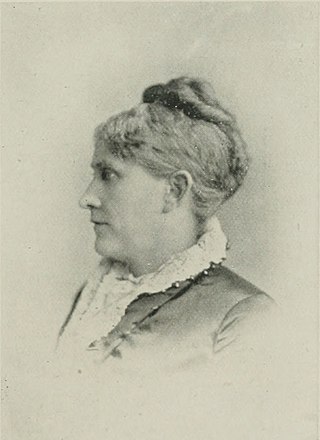
Mary Davy Tenney Gray was a 19th-century American editorial writer, clubwoman, philanthropist, and suffragist from Pennsylvania, who later became a resident of Kansas. She lived in Kansas City, Kansas for more than twenty years and during that time, was identified with almost every woman's movement. She served on the editorial staff of several publications including the New York Teacher, the Leavenworth Home Record, and the Kansas Farmer. Gray's paper on "Women and Kansas City's Development" was awarded the first prize in the competition held by the Women's Auxiliary to the Manufacturers' Association of Kansas City, Missouri.

The Kansas Department for Aging and Disability Services is the second-largest state government agency in Kansas. It is responsible for administering services to older adults, managing the four state hospitals and institutions, and directing health occupations credentialing. The agency was formed on July 1, 2012, as a result of Governor Sam Brownback's executive order that merged the Department of Aging with divisions of the Department for Social and Rehabilitation Services and the Department of Health and Environment.
















